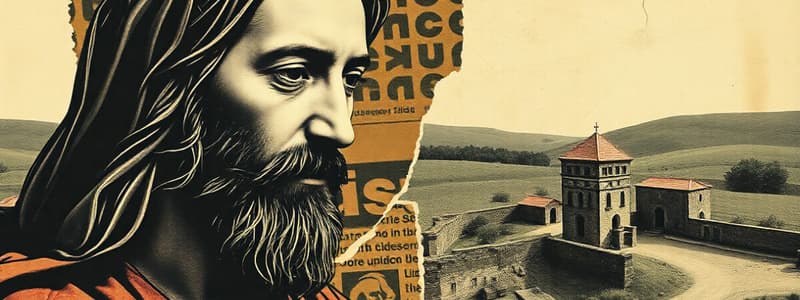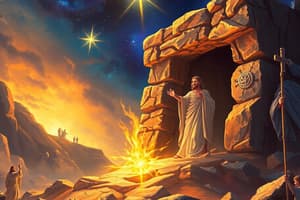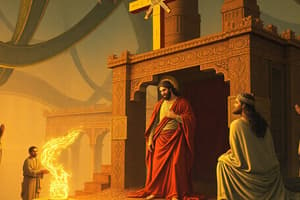Podcast
Questions and Answers
When the disciples inquired about the timing and signs of future events on the Mount of Olives, Jesus's initial response primarily addressed:
When the disciples inquired about the timing and signs of future events on the Mount of Olives, Jesus's initial response primarily addressed:
- the specific date of his return and the end of the world.
- the establishment of his glorious throne and the final judgment.
- the immediate historical events of the Jewish-Roman wars as a precursor. (correct)
- the betrayal by Judas and the plot to arrest him.
In Jesus's analogy of separating sheep from goats, the determining factor for being placed at the 'right hand' is:
In Jesus's analogy of separating sheep from goats, the determining factor for being placed at the 'right hand' is:
- publicly professing faith in him as the Son of Man.
- achieving positions of power and influence in society.
- adhering strictly to religious laws and traditions.
- demonstrating compassion and aid to those in need. (correct)
The Jewish priests and men of influence sought to arrest Jesus cautiously because they were primarily concerned about:
The Jewish priests and men of influence sought to arrest Jesus cautiously because they were primarily concerned about:
- facing criticism from other religious sects.
- violating Roman law and provoking intervention.
- inciting a public uprising by Jesus's followers. (correct)
- disrupting the upcoming religious festivals.
Judas's offer to deliver Jesus to the Jewish authorities suggests that his primary motivation was:
Judas's offer to deliver Jesus to the Jewish authorities suggests that his primary motivation was:
Jesus's discourse about the final judgment and the parable of the sheep and goats are best understood as emphasizing the importance of:
Jesus's discourse about the final judgment and the parable of the sheep and goats are best understood as emphasizing the importance of:
If Judas Iscariot was indeed a Zealot, how might Jesus's actions have caused resentment, leading to Judas's betrayal?
If Judas Iscariot was indeed a Zealot, how might Jesus's actions have caused resentment, leading to Judas's betrayal?
Besides monetary greed and political motivations, which explanation suggests a deeper, more spiritual influence behind Judas's betrayal?
Besides monetary greed and political motivations, which explanation suggests a deeper, more spiritual influence behind Judas's betrayal?
How does the passage imply a potential conflict within Judas regarding his perception of Jesus's role as the Messiah?
How does the passage imply a potential conflict within Judas regarding his perception of Jesus's role as the Messiah?
Given that Judas was paid thirty pieces of silver to betray Jesus, a sum equivalent to the price of a slave at the time, what does this suggest about the perceived value and significance of Jesus by those who conspired against him?
Given that Judas was paid thirty pieces of silver to betray Jesus, a sum equivalent to the price of a slave at the time, what does this suggest about the perceived value and significance of Jesus by those who conspired against him?
Based on the texts provided, what conclusion can be drawn about the definitive motive behind Judas Iscariot's choice to betray Jesus?
Based on the texts provided, what conclusion can be drawn about the definitive motive behind Judas Iscariot's choice to betray Jesus?
What was the significance of the Feast of the Dedication (Hanukkah) in relation to the events described?
What was the significance of the Feast of the Dedication (Hanukkah) in relation to the events described?
Why did Jesus refer to his miracles when questioned about being the Christ?
Why did Jesus refer to his miracles when questioned about being the Christ?
When Jesus claimed, "I and the Father are one," what was the immediate reaction of his questioners, and why?
When Jesus claimed, "I and the Father are one," what was the immediate reaction of his questioners, and why?
How did Jesus attempt to dissuade his questioners from their disbelief and anger?
How did Jesus attempt to dissuade his questioners from their disbelief and anger?
What location does the text specify as the place where Jesus was confronted by priests and scribes?
What location does the text specify as the place where Jesus was confronted by priests and scribes?
Upon witnessing Jesus's arrival after Lazarus's death, Mary and Martha expressed a similar sentiment. What was this sentiment, and what was Jesus's immediate emotional response to their grief?
Upon witnessing Jesus's arrival after Lazarus's death, Mary and Martha expressed a similar sentiment. What was this sentiment, and what was Jesus's immediate emotional response to their grief?
When Jesus instructed them to remove the stone from Lazarus's tomb, Martha objected, citing the odor after four days. This objection primarily reveals what aspect of Martha’s character in this narrative?
When Jesus instructed them to remove the stone from Lazarus's tomb, Martha objected, citing the odor after four days. This objection primarily reveals what aspect of Martha’s character in this narrative?
The Sanhedrin convened in response to the miracle at Bethany. What was the most pressing concern that motivated their meeting and deliberations regarding Jesus?
The Sanhedrin convened in response to the miracle at Bethany. What was the most pressing concern that motivated their meeting and deliberations regarding Jesus?
Caiaphas's statement, 'it is expedient for you that one man should die for the people,' is presented as having a dual significance. What was the intended meaning from Caiaphas's perspective, and what deeper, unintended truth does the text suggest it holds?
Caiaphas's statement, 'it is expedient for you that one man should die for the people,' is presented as having a dual significance. What was the intended meaning from Caiaphas's perspective, and what deeper, unintended truth does the text suggest it holds?
Following Caiaphas's intervention in the Sanhedrin's deliberation, what immediate decision was reached regarding Jesus, and what course of action did they subsequently undertake?
Following Caiaphas's intervention in the Sanhedrin's deliberation, what immediate decision was reached regarding Jesus, and what course of action did they subsequently undertake?
Flashcards
Thirty pieces of silver
Thirty pieces of silver
The amount Judas was paid to betray Jesus.
Judas's Zealot Ideals
Judas's Zealot Ideals
A possible motive for Judas's betrayal, stemming from disappointment in Jesus's message.
Satan's Influence on Judas
Satan's Influence on Judas
One explanation states that Satan influenced Judas in his decision to betray Jesus.
Mary of Bethany's Anointing
Mary of Bethany's Anointing
Signup and view all the flashcards
Zealots
Zealots
Signup and view all the flashcards
Hanukkah
Hanukkah
Signup and view all the flashcards
Portico of Solomon
Portico of Solomon
Signup and view all the flashcards
Jesus's Identity
Jesus's Identity
Signup and view all the flashcards
Significance of Miracles
Significance of Miracles
Signup and view all the flashcards
"I and the Father are one"
"I and the Father are one"
Signup and view all the flashcards
Mount of Olives Discourse
Mount of Olives Discourse
Signup and view all the flashcards
Sheep and Goats Parable
Sheep and Goats Parable
Signup and view all the flashcards
Helping 'The Least of These'
Helping 'The Least of These'
Signup and view all the flashcards
Plotting Jesus' Death
Plotting Jesus' Death
Signup and view all the flashcards
Judas' Betrayal
Judas' Betrayal
Signup and view all the flashcards
Miracle in Bethany
Miracle in Bethany
Signup and view all the flashcards
Sanhedrin
Sanhedrin
Signup and view all the flashcards
Fear of Roman Intervention
Fear of Roman Intervention
Signup and view all the flashcards
Caiaphas
Caiaphas
Signup and view all the flashcards
Expediency of Jesus' Death
Expediency of Jesus' Death
Signup and view all the flashcards
Study Notes
The Beginnings of the End
-
Priests and scribes confronted Jesus at the Temple enclave during Hanukkah, asking if he was the Christ
-
Jesus responded, reminding them of his miracles as proof so that those who believed in him had a good reason to
-
Questioners perceived blasphemy when Jesus claimed "I and the Father are one" and snatched up rocks to throw
-
Jesus told them to believe the works if they do not believe him before any rocks were thrown
The Raising of Lazarus
-
Jesus gave possible disciples the warning that life with him would not be easy
-
There was at least one house in Judea that offered a friendly welcome, the home of Lazarus and his sisters Martha and Mary, located in Bethany
-
Martha and Mary request that Jesus come quickly as Lazarus was seriously ill
-
Jesus delayed
-
Jesus told his companions that Lazarus had fallen asleep and if that was the case, that he would recover
-
Jesus stated that Lazarus was dead
-
The disciples hesitated when Jesus set out to go see Lazarus
-
When they reached the house in Bethany, Martha told Jesus that if he had been there, her brother would not have died
-
Jesus assured Martha that her brother would rise again
-
Jesus declared "I am the resurrection and the life; he who believes in me, though he die, yet shall he live"
-
Mary arrived, fell weeping at Jesus' feet and repeated Martha's words
-
Jesus wept too
-
The tomb was a cave carved in a hillside with a stone in front
-
Jesus asked them to take away the stone
-
Martha remarked there would be an odor because Lazarus had been dead for four days
-
They rolled back the stone
-
Jesus prayed, and called Lazarus out of the tomb
-
Lazarus, still wrapped in burial clothes, emerged
The Sanhedrin Deliberates
-
The miracle in Bethany caused the high priests and Pharisees to convene the Sanhedrin to consider their options
-
A worry that everyone will believe in Jesus and the Romans would destroy both their holy place and their nation was expressed
-
If the Romans suspected the Jews were inciting an uprising, they would respond harshly
-
Caiaphas, the high priest, said that it was expedient for one man to die for the people, so the whole nation would not perish
-
They took counsel about how to put Jesus to death
Events Leading to the Betrayal
-
Lazarus, Martha, and Mary honored Jesus
-
Mary anointed Jesus' feet with costly ointment
-
Judas Iscariot grumbled that the ointment should have been sold for 300 denarii and given to the poor
-
Early the next day, Jesus set out for Jerusalem
-
A column of pilgrims recognized Jesus and enthusiastically saluted him
-
Jesus rode on a donkey as foretold by prophet Zechariah
-
The people waved palm branches and shouted, "Hosanna! Blessed is he who comes in the name of the Lord, the King of Israel!"
-
Some Pharisees watched angrily and said, "Look, the world has gone after him"
-
Jesus paused to weep over Jerusalem and warn of the terrible fate awaiting it
-
He further outraged his critics by driving out the money changers and sellers from the Temple
-
He declared, quoting Isaiah, "My house shall be a house of prayer; but you have made it a den of robbers"
The Beginning of the End
-
Jesus spoke of the terrible events during the Jewish wars against Rome in A.D. 66-70 and 115-117
-
The discourse concluded with "When the Son of man comes in his glory, and all the angels with him, then he will sit on his glorious throne"
-
Judas agreed to deliver Jesus over in exchange for money
-
The priests paid Judas 30 pieces of silver
Judas' Motivation
- John claims that Judas was a thief who stole from the common purse
- His grumbling at Mary using expensive nard to anoint Jesus' feet suggests an unhealthy fondness for money
- Thirty pieces of silver was the price of a slave
- Judas may have been furious for Jesus' way of being Messiah
- Judas may have been a zealot
- Satan may have taken possession of his heart and persuaded him to betray his Lord
Reasons Jesus' Enemies Wanted to Kill Him
- The enemies wanted to kill Jesus
- There are three possible reasons for this, not mutually exclusive
Political Reasons
- Jesus' increasing popularity among the common people was a threat to the limited authority of the religious establishment
- Caiaphas pointed out the real danger that the Romans, once sufficiently provoked, would get rid of them all and install a Romanized power structure
Religious Reasons
- A disregard for the Jewish law which involved violating the Sabbath by healing the sick and crippled
- Ignoring rules of ritual purification Consorting with sinners and Gentiles, even despised Samaritans
- Shunning them in the manner of the righteous Pharisees
Blasphemy
- Ignoring recognized teachers who held forth in the Temple
- Explounding the law without reference to their interpretations
- Teaching and acting like someone whose authority was his by right
The Aftermath
- Weeks passed after the raising of Lazarus, Jesus and his disciples moved to a town north of Jerusalem called Ephraim
- Passover was soon
- There was speculation about whether he would risk returning to Jerusalem
- Six days before the feast, he traveled to Bethany for a dinner
Jesus' Response to the Sadducees
- The Sadducees questioned belief in the afterlife reflecting this disbelief
- There will be no marrying in heaven and all those who go there "are equal to angels and are sons of God, being sons of the resurrection"
- The Sadducees no longer dared to ask Jesus any questions
Jesus Leaves the Temple
- Jesus' companions marveled at the awesome structure size and grandeur
- Jesus had a somder mood, saying that "There will not be left here one stone upon another, that will not be thrown down"
- When asked what would be the sign of the world coming to an end, Jesus said "“And they will go away into eternal punishment, but the righteous into eternal life.”
Studying That Suits You
Use AI to generate personalized quizzes and flashcards to suit your learning preferences.




